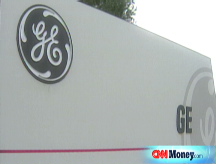General Electric delivers a shock
Shares of the conglomerate - a symbol for the nation's economy - tumble on a surprise decline in earnings and lowered forecasts.
 |
| GE posted a surprise earnings miss Friday, brought down by its struggling financial services division. |
NEW YORK (CNNMoney.com) -- General Electric - widely viewed as a proxy for the U.S. economy - posted a surprising first-quarter earnings miss Friday, deflating investors' hopes that the conglomerate could rise above a continued economic slowdown.
GE also lowered its full-year earnings guidance, and its second-quarter forecast fell short of analysts' expectations.
Shares of GE (GE, Fortune 500) - a Dow Jones industrial average component - tumbled about 12% in Friday trading, and the results sent the stock market tumbling.
GE reported net income fell 6% to $4.3 billion after reporting income of $4.6 billion in the first quarter of 2007.
Earnings from continuing operations were 44 cents per share, down from 48 cents per share a year earlier and well below the 51-cent-a-share consensus forecast of analysts polled by Thomson Financial.
"This came as a surprise to analysts, because the company reinforced its expectations for the first quarter in March," said Jefferies & Co. analyst Robert Schenosky.
Sales rose 8% to $42.2 billion, which missed analysts' forecast of $43.7 billion. A year ago, GE reported revenue of $39.2 billion.
GE has typically been a model of consistency, rarely missing - or beating - estimates. Only once since the start of 2006 has GE failed to deliver earnings that exactly met First Call's forecast, according to the earnings tracker. That was in the second quarter of 2007, when it beat the earnings per share forecast by a penny.
With businesses in a multitude of sectors, such as health care, finance, energy, consumer electronics, industry and media, many consider GE to be a barometer for the health of the U.S. economy.
Poor environment dooms earnings
But even with strong exposure in markets overseas - and a 22% year-over-year gain in global revenue - the multi-faceted corporation still could not avoid taking a hit to its financial services division amid a U.S. credit crisis.
"Our primary shortfall was a decline in financial services earnings," said GE chairman and chief executive Jeff Immelt. "We knew the first quarter was going to be challenging, but the extraordinary disruption in the capital markets in March affected our ability to complete asset sales and resulted in higher mark-to-market losses and impairments."
GE's commercial finance division posted earnings that were down 20% from year-earlier results, and GE Money came in 19% below last year. Results were mostly hampered by a struggling real estate market, as GE's home loan division posted earnings that came in 16% below last year's levels.
"On the finance side, GE isn't bound by the same rules that financial institutions are, which is why they've been able to outperform them in the past," said Jefferies' Schenosky. "But there is still exposure to the economy - they are not immune."
Also dragging results down were double-digit percentage drops in the health care division and in the industrial division, which struggled on slumping consumer sales.
"The problem with the GE model is that it purchases large, mature acquisitions that are already at full price," said Schenosky. "It's become increasingly cyclical and difficult to improve upon."
The poor first-quarter showing prompted GE to lower its full-year earnings guidance to $2.20 to $2.30 per share, reflecting flat to 5% growth. That's down from the original $2.42 per share forecast that GE gave before the first-quarter results were released.
The conglomerate expects its financial services earnings to decline 5% to 10% in 2008 and gave second-quarter guidance of 53 to 55 cents per share, falling short of analysts' expectations of 58 cents per share.
"We want to make sure this doesn't happen again, so we're not assuming anything will get better this year," said GE vice president of investor communications, Dan Janki. "We wanted to give a framework that reflects the reality we're dealing with and takes into a need for more flexibility in a volatile world."
Though GE reaffirmed its first-quarter guidance in mid-March, it said the fallout from the Bear Stearns collapse led to a much more difficult environment in the last two weeks of the quarter.
"The last two weeks of March were a different world in terms of financial services," said Immelt on a conference call with analysts. "There was a real inability to do transactions in those weeks that we normally can get done."
Some divisions, however posted stronger results. NBC Universal posted a 3% earnings improvement over last year, despite calls from shareholders to dump the media division. And GE's infrastructure segment gained 17% more than last year on strong energy revenue and large global demand for wind turbines.
"While we are disappointed with our results, the fundamentals of our businesses are strong," Immelt said. "Nevertheless, we failed to meet our expectations." ![]()


